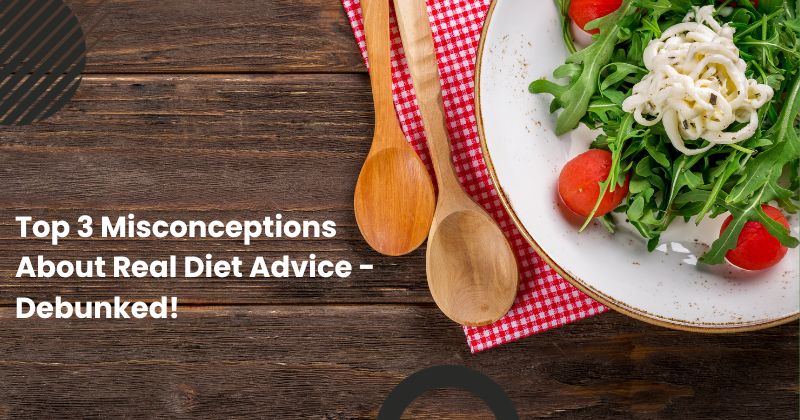Breaking down common misconceptions about real diet advice that can prevent you from making informed decisions.
Navigating the world of dieting and nutrition can be a bewildering experience, with myriad ideas and opinions leading to a plethora of misconceptions. With the rise of social media influencers and self-proclaimed health gurus, misinformation is at an all-time high. It’s often hard to discern science-backed advice from mere myths. As diet trends evolve, misconceptions about real diet advice proliferate, blurring the line between fact and fiction. This has led to confusion and misinterpretation, creating a challenging landscape for individuals seeking sound nutritional guidance. We understand the struggle and are here to provide clarity. In this article, we will debunk the top three misconceptions about real diet advice, separating the wheat from the chaff when it comes to diet and nutrition. Our goal is to arm you with accurate information, helping you make informed choices that will positively impact your health and wellbeing. Get ready to embark on an enlightening journey through the realm of real diet advice.
Misconceptions About Real Diet Advice
The internet is rife with misinformation, and dieting advice is no exception. To help you make informed decisions about your diet and health, let’s delve into the top three misconceptions about real diet advice:

1. Misconception: “All calories are created equal.”
Fact: All calories are not created equal.
This first misconception stems from a misunderstanding of the very nature of calories. While it’s true that all calories have the same energy content, how our bodies metabolize different foods can significantly vary. This is because foods go through different metabolic pathways, which can have vastly different effects on hunger and how many calories we burn.
| Food Type | Effect |
| Protein | High thermic effect, satiating |
| Complex Carbohydrates | Moderate thermic effect, filling |
| Simple Sugars | Low thermic effect, less satisfying |
The table above illustrates the different effects various food types have on our bodies. Proteins have a high thermic effect, meaning they burn more calories during digestion. They also keep us feeling full for longer. Complex carbohydrates also have a moderate thermic effect and keep us feeling full. In contrast, simple sugars have a low thermic effect and are less satisfying, often leading to overeating.
2. Misconception: “Fat makes you fat.”
Fact: Eating fat doesn’t necessarily make you fat.
Fat has often been demonized in the diet world, giving birth to this second misconception. However, eating fat does not directly lead to weight gain. On the contrary, healthy fats play a critical role in maintaining optimal body function. They assist in vitamin and mineral absorption, blood clotting, building cells, and muscle movement.
However, it’s essential to differentiate between healthy fats and unhealthy fats. Healthy fats such as monounsaturated and polyunsaturated fats, found in avocados, fish, and nuts, contribute positively to our health. On the other hand, trans fats and saturated fats, found in processed foods and red meat, can increase unhealthy LDL cholesterol and lower healthy HDL cholesterol, contributing to heart disease.
3. Misconception: “Carbohydrates are bad for you.”
Fact: Not all carbohydrates are bad.
The vilification of carbohydrates is the third common misconception about real diet advice. Carbohydrates are the body’s main source of energy, and when eaten in moderation, they form a vital part of a balanced diet.
The key lies in choosing the right type of carbohydrates. Complex carbs, found in whole grains, fruits, and vegetables, are high in fiber, keeping you full and providing sustained energy. Conversely, simple carbs, found in sugary drinks, pastries, and processed foods, can lead to blood sugar spikes and crashes, causing you to feel hungry sooner and potentially leading to weight gain.
Key Takeaways
Understanding the truth behind these misconceptions about real diet advice is paramount for maintaining a balanced, healthy diet. Here are the key takeaways from this article:
- Not all calories are created equal: Different types of foods go through different metabolic pathways, and therefore have different effects on hunger and how many calories we burn.
- Fat doesn’t make you fat: Healthy fats are an essential part of our diet, contributing positively to our health. It’s crucial to differentiate between healthy fats and unhealthy fats.
- Not all carbohydrates are bad: Complex carbohydrates are a good source of sustained energy and keep you full, whereas simple carbohydrates can lead to blood sugar spikes and crashes.
With these debunked myths, we hope that the path to understanding real diet advice becomes a little clearer. Armed with this knowledge, you can make informed dietary choices that will contribute positively to your overall health and well-being.
Frequently Asked Questions (FAQs)
1. Are all calories the same?
No, all calories are not the same. While all calories provide the same amount of energy, the type of food from which they come affects how they are metabolized and used by the body.
2. Does eating fat make me gain weight?
Not necessarily. Consuming healthy fats as part of a balanced diet will not directly lead to weight gain. It’s the overconsumption of calories, irrespective of whether they come from fats, proteins, or carbs, that results in weight gain.
3. Are carbohydrates bad for me?
Not all carbohydrates are bad. It’s essential to differentiate between simple carbs and complex carbs. Complex carbs, like those found in fruits, vegetables, and whole grains, are beneficial and necessary for energy.
4. What are examples of healthy fats?
Healthy fats are monounsaturated and polyunsaturated fats. These are found in foods like avocados, fish, nuts, and seeds.
5. What are examples of unhealthy fats?
Unhealthy fats are trans fats and saturated fats. They are found in processed foods, fried foods, and red meats.
6. What are the benefits of complex carbs over simple carbs?
Complex carbs are high in fiber, keeping you full and providing sustained energy. Conversely, simple carbs can lead to blood sugar spikes and crashes, making you feel hungry sooner and potentially leading to weight gain.
7. How does the body metabolize different types of food?
Different types of foods go through different metabolic pathways. For example, protein has a high thermic effect, meaning it burns more calories during digestion. In contrast, simple sugars have a low thermic effect and are less satisfying.
8. How can I apply this real diet advice in my daily routine?
Understanding these misconceptions can help you make more informed dietary choices. Incorporate a balance of proteins, healthy fats, and complex carbs into your diet. Avoid overconsumption of simple carbs and unhealthy fats. Lastly, remember that a balanced diet is just one aspect of overall health; regular exercise and a healthy lifestyle are equally important.
Conclusion
In a world awash with dieting myths and nutritional misinformation, the article serves as a lighthouse, guiding us toward evidence-based truths. It successfully debunks three pervasive misconceptions about dieting: the equality of all calories, the vilification of fats, and the blanket demonization of carbohydrates. By doing so, it empowers readers to make more informed choices, steering them away from the pitfalls of trendy but unfounded diet advice. The article emphasizes the importance of discernment in choosing the types of calories, fats, and carbohydrates we consume, highlighting that quality often trumps quantity. It also reminds us that a balanced diet is just one facet of a healthy lifestyle, subtly urging us to consider other elements like exercise and mental well-being. Armed with this newfound knowledge, we are better equipped to navigate the complex landscape of diet and nutrition, making choices that positively impact our overall health. In essence, the article is more than just a debunking piece; it’s a call to action for mindful, educated eating.
Recommended Post For You
- Boost Your Health with These 7 Real Diet Advice Tips
- Master Your Meals: Real Diet Advice for Meal Planning
- Why ‘Real Diet Advice’ Isn’t As Scary As You Think!
- Stop Guessing: Get the Real Diet Advice You Deserve
- Is Real Diet Advice a Game-Changer? Truth Revealed!
- 10 Reasons You Need Real Diet Advice for a Healthier Life
- Real Diet Advice: Transformative Tips Beyond the Hype
- Uncover the Secret of Real Diet Advice – The Ultimate Guide
Reference:
- “Not All Calories Are Created Equal, Explains Study”
- “Dietary fats: Know which types to choose”
- “Carbohydrates and Weight Loss: Should You Go Low-Carb?”
- “The Truth About Fats: the Good, the Bad, and the In-Between”
- “The complex carbohydrate conundrum”
- “Simple vs Complex Carbohydrates”
